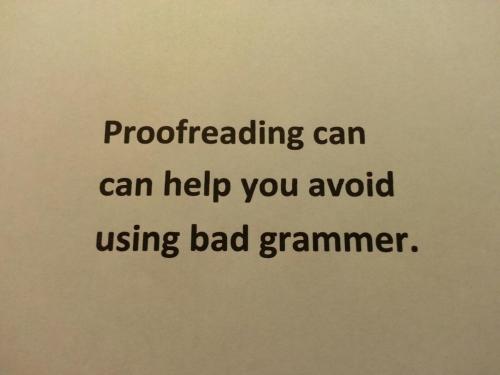Revise Out Loud
 Many years ago, while working as an editor/proofreader for a large publishing house, I learned two very useful editing tricks: (1) to catch spelling errors, read the text backwards, and (2) to revise, read the text out loud.
Many years ago, while working as an editor/proofreader for a large publishing house, I learned two very useful editing tricks: (1) to catch spelling errors, read the text backwards, and (2) to revise, read the text out loud.
It’s easy to understand why reading a text backwards helps us catch spelling errors: Our brains are wired for comprehension, so we instinctively gloss over misspellings and fill in missing words to create and understand the context, the meaning, of the written work. (Did you spot the two mistakes in the accompanying photograph?) But if you remove the context in your proofreading (by reading the text backwards), you are forced to actually look at each word (and its spelling), and thus it’s easier to catch spelling mistakes, and sometimes, grammatical mistakes as well.
Reading a text backwards removes context, making it easier to spot errors; But reading a text out loud emphasizes context, making it easier to revise what you have written.
When we write and then read (to ourselves) what we have written, our brains analyze those words for meaning. But when we read that same text out loud, a different part of the brain is hearing those words for the first time, and analyzing them fresh. That part of the brain answers the context question of “how does this sound?” literally. This is especially true for poetry, which was an oral art long before it was a written art. Take anything you’ve written – if you want to know if you can say it better, say it out loud. #writer #poetry


